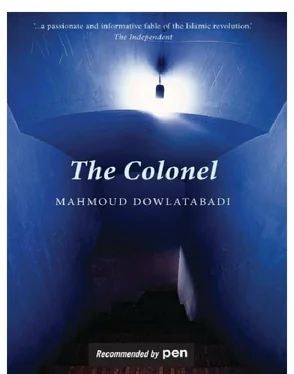“Right, we’re taking you to the prosecutor’s office.”
“The prosecutor’s office?”
“It’ll all become clear when you get there, colonel.”
Now, whatever I do I mustn’t look surprised or appear indignant. I need to behave myself. I’ve been telling myself for ages that I mustn’t boil over and lose my temper. I mustn’t let anything faze me ever again. No, whatever happens, I mustn’t be surprised. It’s the only way of steeling yourself against nasty bombshells. I live in the past anyway. Maybe it’s to do with my army service under the Shah, or Kuchik going to the Iraqi front, or what happened to my wife… or Parvaneh… I don’t know. It could be one of a thousand things. But the butterflies in my stomach I can’t do anything about. Not a thing! Look at me, I can’t even go downstairs without locking the door behind me.
It’s lucky I didn’t leave my hat behind. It’s on my head. Just to be sure, I’m putting my hand up to my head to touch it once more. I’ve got enough of my wits about me to realise that I need to turn up my coat collar to stop the rain wrapping itself round my neck like a chain. And of course I mustn’t let these young men find out that Amir’s in the basement. It probably doesn’t matter, but I have a feeling that my Amir’s hiding himself away there for over a year might raise the odd doubt or two and give rise to some curiosity, or even suspicion. There is just no logical reason for an ex-political prisoner, particularly one under forty, to hide himself in the basement of his parents’ house, turning himself back into a prisoner, as it were, and cutting himself off as much as he can from his own family. Such behaviour is bound to make the authorities suspicious, especially with a chap like Amir. Amir isn’t really crazy. I mustn’t even think about him. Many times I’ve heard him talking to his sister Farzaneh. She does bang on a bit, and she gets carried away with sisterly concern. She’s the same sort of age as Amir, so when she gets the chance, she comes and sits at the top of the basement stairs and starts pouring out her heart to him.
“Why are you sitting all hunched up, brother? What is it? Has the world come to an end? First of all, it hasn’t, and secondly, plenty of other people like you are out of work. That’s no reason to creep into a corner and shut yourself away like a leper. What’s up, Amir, my darling brother? At least think of Papa. He’s really aged since we heard about Mohammad-Taqi. You mustn’t be the end of him. Papa has had a really hard time, as you know better than any of us. You are the eldest son, after all, so you’ve got to start thinking about the family a bit more, about us. I’m just a married woman, I don’t have a choice. You know very well that my husband, Mr Qorbani, has banned me from coming here. My son is getting wind of things and his father’s started quizzing him. The boy can’t hold his tongue and he says things. He’s only a child, after all. He doesn’t understand. And my daughter. And the baby is always in the way. And Qorbani Hajjaj 3is a worried man, he suspects everyone and everything. But I can’t help myself. If I don’t come and see you, I’m so jumpy and ill at ease that I feel as if my clothes were on fire. 4Look, brother, I have to put up with my husband and obey him. I may just have to stop coming here to see you. Because Qorbani says that if I come here it will go on his file and he’ll have problems. Hajjaj is worried about his position, because they’re taking an unpleasant interest in him. It could cost him his job, he says. Tongues are wagging and they have given you and our whole family a bad name, brother. You know only too well, brother, that having a bad reputation you can’t get rid of is a worse fate than having a roof fall on your head. Every memorial service for these young men I go to, the women are talking about you. Some of them have sharp tongues, bro. But I can’t not go. When you get a bad name like that, you want to run away from yourself. I want to tell everybody a hundred times that I am someone else, not the person they think I am, but in my thoughts I am always with you!
So, my dear brother, I have to keep away from you, or rather… from myself. But every time I see you or think of you, every time I think of the state Papa is in, shrunk to the size of a pullet as he is, I get a lump in my throat, my heart wants to burst and I want to melt away, I want the earth to swallow me up. Amir, Amir… my darling brother, just say something, just answer me, for heaven’s sake. You’re going to be the death of our father if you carry on like this. Look, you were such a good boy, why did you suddenly go this way? You always used to give good advice to people and taught them things. Your pupils gathered round you like moths to a flame, they loved you like an elder brother. You’re already getting grey hairs, dear brother!”
I could hear her going on like this while I was rereading, for the hundredth time, the story of Manuchehr and Salm, Tur and Iradj, who had become so familiar to me that I could imagine myself caught up in the tangled mess of their lives. 5Recently I’d noticed how Amir had become even more cross-eyed: his expression was more vacant than ever, and an air of something between shame, panic and doubt — in any event an emotion that went beyond despair — had taken up residence behind his eyes. His long greasy hair fell over his shoulders and streaks of grey had appeared, not just on his temples, but in the middle of his head as well. I saw my son through the frosted glass of the basement door, and he was shrivelling up and growing old in front of my very eyes and I could do nothing for him. For some nights I had been hearing him scream and I felt for him in his frightening nightmares. Visions of catastrophe, of people falling off a high roof, or off towering rocks down into a hole, into nothingness, of young men plummeting into the black abyss of despair, dreams of distorted faces that had seen pain, only pain. Dreams of wild cries of despair, dreams of fathers taking their sons to the slaughterhouse to end it all, and of women ripping open their wombs so that no seed should take — and this was all that they could do, nothing else… And screams, silent screams of despair, muffled as if through cotton wool.
Horrible chimeras plagued him. It took a lifetime for me to get used to witnessing all this without going crazy myself. But Amir still hasn’t managed to treat these horrors as normal. It seems to me that he’s tormented by a sense of guilt, like a broken bone sticking through a wound. Amir is still a boy to me, but not so young that he will take my advice any more. As time passes, we seem to be gradually losing our common language. He isn’t interested in a heart-to-heart and I’m too ashamed to talk. What could I say to him that wouldn’t seem forced or contrived? How can an entire nation endure so many long silences and so many unspoken words?
That leaves only Farzaneh, who comes over whenever she can get away from her husband, and tries to draw Amir out in her artless way, because she can reduce big worries into little words and is less anxious about exactly how she should put things. Farzaneh just sits down on the top step of the basement stairs, holding her baby on her knee like a good woman, and weeps quietly as she speaks to Amir and, if I pay attention, I can just make out what she is saying:
“I’m dying of grief, Amir, at least have pity on me. I can’t bear just watching you waste away in front of my eyes… I’ve now lost all of you, one way or another. First Mohammad-Taqi, then Masoud, well… we have no idea what happened to him and I’m beginning to lose hope. And our Parvaneh… Parvaneh… my little sister, Amir! Nothing is clear, nothing is certain on this earth except death: death, which has now lost face, lost its dignity. Whenever I imagine the day when they’ll bring in Masoud’s corpse, or at least his dog tag, I just laugh, because I won’t know what to do about it. And whenever I think of the day when they brought in Mohammad-Taqi’s body, and I didn’t know what to do, I just cry. Death and dying, there’s so much death… All my brothers… Just look what’s happened to us all, that I can talk about death so openly and shamelessly. What will happen to our sister, Amir, our little sister? The town is full of shrines to young men and coffins are being carried through the streets and the roads are wet with blood and my husband has become an agent of death, now that he’s decided to do… God knows what! There is such a lump in my throat, little brother, that I can hardly breathe and you… so silent, so silent… rescue me from this despair, little brother, Amir, Amir! I can see you withering away and it’s just killing me. At least say one word to me, please Amir, just one word!”
Читать дальше












